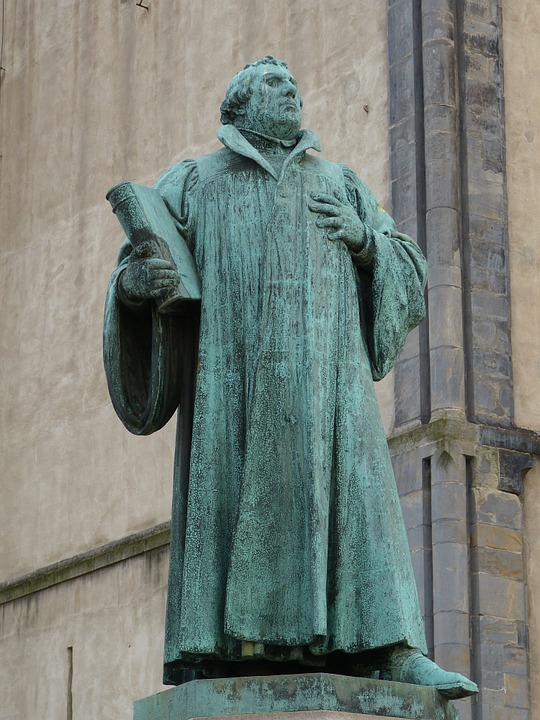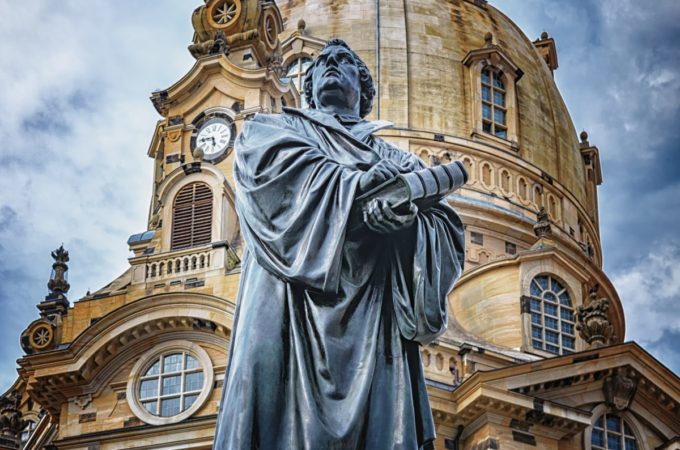Martin Luther
The role of the arts in spreading a Christian worldview is a frequent theme in this space. Darrow Miller often points out that the church largely abandoned the study and practice of the arts generations ago and we are reaping the fruit of that today. The world’s music and art, not that of the church, has largely discipled the nation.
It was not always thus, as you will read below.
This post is to point our readers to a little known truth about the great reformer, Martin Luther. You probably know that he wrote the hymn “A Mighty Fortress.” But you maybe did not know that that hymn is the tip of the euphonious iceberg. Under that well-known piece of music lies an extensive body of musical achievement.
The following article by Andrea Valentino originally published at TFI Daily News under the title “Martin Luther: Father of Protest Songs?”
~
Tomorrow, the Brandenburg Gate to his back, Barack Obama will give a landmark speech in honour of Martin Luther and the Protestant Reformation. The speech marks a high point in a frenetic year of celebration. Dozens of new books and exhibits are marking the 500th anniversary of his revolution. Playmobil, a toy company, has even released a dinky Luther figurine. All this is unsurprising: by turning against many of the major teachings of the Catholic Church and publishing a complete translation of the Bible into German, Martin Luther pushed Europe towards the modern world.
But if Europe is still shaped by Luther’s political and religious legacy, his musical contributions are less famous. In fact, music was crucial to his ideology, and  encouraged radical singers long after his death. His popular musical style, meanwhile, is immediately comparable with some of the most well-known protest movements of the modern age.
encouraged radical singers long after his death. His popular musical style, meanwhile, is immediately comparable with some of the most well-known protest movements of the modern age.
Luther regard music as a “gift from God”
Before 1517, the Catholic Church controlled most religious music in Europe. Lay participation was minimal. In church, most people only heard austere plainchant, sung in Latin by a choir. Passion plays–rowdy dramas describing biblical stories–introduced religious ideas to people in their own languages. But by the 16th Century, these plays had often slumped into an excuse for slapstick humour. And anyway, vernacular music rarely crossed the church threshold.
Luther shattered these strict divisions, and transformed Christian musical life. For him, religious music was not just for remote priests and choirs. Instead, it was “next to theology” and a “gift from God.” As such, it should be accessible to everyone. After all, he wrote, “by embellishing and ornamenting their tunes in wonderful ways, [singers could] lead others into a heavenly dance.” Anyone who disagreed “deserved to hear nothing but the braying of asses and the grunting of hogs!”
Luther scrabbled to develop these ideas as fiercely as he did his thoughts on the Pope or the evils of indulgences (where time in purgatory could be slashed in return for a handy payment to the local priest). Latin chanting was dumped in favour of communal singing in everyday German. This style soon became a key part of his followers’ identity. “Luther’s use of German hymns was an important sign of change,” explains Andreas Loewe, dean of St Paul’s Cathedral in Melbourne and Luther expert. “It was just as obvious as having married clergy, or being able to receive a cup of wine at Holy Communion as a lay person.”
Luther understood the power of music
Not that Luther promoted music just for abstract reasons of faith. He well understood how powerful music was in spreading his message. Like the best modern protest songs, his hymns were catchy and punchy. He added religious lyrics to recognisable folk songs, just as We Shall Overcome hatched from an old southern Gospel song. This was especially useful in an ignorant age. Even illiterate people–about 85% of the German population in 1500–could learn songs and pass them on quickly.
Luther himself pushed these changes along. He encouraged children to learn music at school, and worked with other reformers to produce Protestant hymnbooks. Luther also wrote lyrics that “imitated the way people spoke,” says Loewe. Luther himself stated that both music and lyrics should “grow out of the true mother tongue.” Ein Feste Burg (A Mighty Fortress) is typical of his rousing simplicity:
Our God is a mighty fortress,
A trusty shield and weapon!
Songs like this stiffened the hearts of Luther and his friends. They likely sang Ein Feste Burg at the Diet of Worms, when Luther was interrogated by Charles V, the Holy Roman Emperor. This has striking parallels with more modern protest movements. After all, anti-Vietnam War protesters rallied to Give Peace A Chance in the face of violent backlash, while anti-Apartheid campaigners sang Soweto Blues after a racist massacre in South Africa.
Even Catholics sang Luther’s music
 But if Luther’s music was soothing to supporters, his hymns also grabbed new converts. New music buzzed from town to town before the Catholic authorities could swat it down. As with other aspects of the Reformation, the printing press was key. “Luther’s hymns were sold ‘hot off the press’ as pamphlets, and taught to entire cities by travelling singers,” says Loewe. Sometimes, Luther’s hymns worked faster than he did. In Magdeburg, massed singing of his anthems converted the town months before Luther arrived.
But if Luther’s music was soothing to supporters, his hymns also grabbed new converts. New music buzzed from town to town before the Catholic authorities could swat it down. As with other aspects of the Reformation, the printing press was key. “Luther’s hymns were sold ‘hot off the press’ as pamphlets, and taught to entire cities by travelling singers,” says Loewe. Sometimes, Luther’s hymns worked faster than he did. In Magdeburg, massed singing of his anthems converted the town months before Luther arrived.
Contemporaries valued the spread of this music. Writing 50 years after Luther died, theologian Cornelius Becker noted that “[Luther’s] songs were carried to people in far-away places in the souls and minds of pious Christians. It was not easy to block their progress.” Indeed, Lutheran hymns had soon skipped out of his stronghold in Saxony. They were sung in Catholic areas, and translated into English. All this shares much with modern protest music. Just as the socialist anthem The Internationale became famous from Madrid to Moscow–even among people who did not understand the niceties of Marxist dogma–Lutheran hymns bounced around Europe as a snappy mark of solidarity with unknown allies.
Luther’s music stayed popular after his death. Protestant troops sang Lutheran hymns as they went into battle during the Thirty Years’ War in the 17th Century. Later Protestant composers also covered his hymns. Johann Sebastian Bach expanded Ein Feste Burg to a glorious 30-minute cantata, while Felix Mendelssohn added it to his aptly named Reformation symphony. This trend has continued to modern times: Lutheran hymns still feature in Catholic and Protestant hymnbooks. For Romantic writer Heinrich Heine, Ein Feste Burg was nothing less than the “Marseillaise of the Reformation” that “has preserved to this day its inspiriting power.”
Luther became the grandfather of a music revolution
Like the real Marseillaise, meanwhile, Luther’s music has proved boundlessly supple. During the 1848 revolution, liberals sang a new version of Ein Feste Burg to promote “freedom” and “truth”. In the 1880s, German social democrats rewrote the same hymn to include references to human rights. A century later, opponents of a new nuclear waste plant used Ein Feste Burg to attack the “armed police”. Loewe notices the irony here. “Just as the reformer took stirring tunes and composed new words for them,” he explains, “so many protest movements used Luther’s tunes to promote ideas other than Luther’s own.”
This feels fitting. Through his hymns, Luther is grandfather of a musical revolution that shared and adapted, united in stomping change on the world through rousing melodies and simple words. But if Martin Luther helped spur on modern protest music, he can still flicker moments of private contemplation. “I never go through a day without listening to some Lutheran chorales or organ renditions of great Christian music,” explains Martin E Marty, a religious scholar. Andreas Loewe agrees. “I love to sing,” he says. “Whether as part of our worship at St Paul’s Cathedral, or with friends, or as part of the Melbourne Symphony Orchestra Chorus with whom I get to perform a couple of times a year–I share Luther’s belief that music is a most ‘beautiful and priceless gift of God.’”






